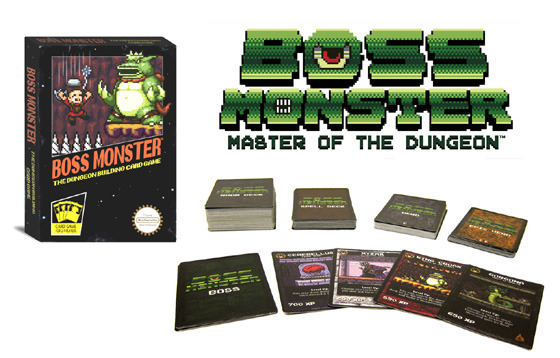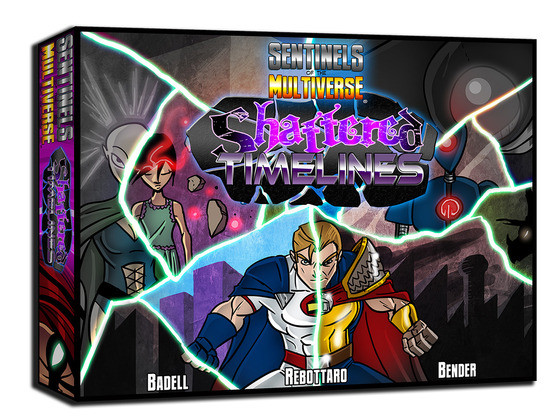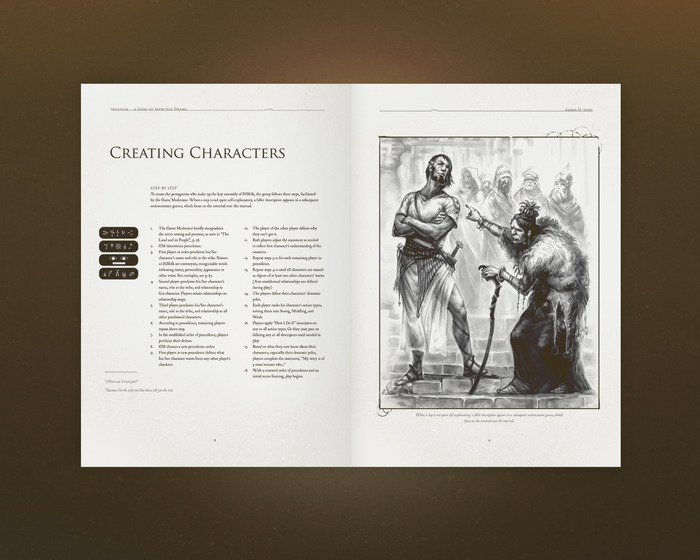I know a lot of interesting people. Some I’ve worked with, some I’ve met while traveling the world, some just owe me money. My name may be on the website, but it seems kind of boring if I’m the only person whose voice is heard here. So I’m bringing some of my friends to the site, as time permits. I’m not a podcasty kind of guy, so I’m just keeping things simple: one guest, six questions.
My next guest is ROBIN D. LAWS. One of the great RPG designers of our time, Robin has been an inspiration to me throughout my career. You may know him from Feng Shui, the GUMSHOE investigative roleplaying system, Heroquest, the Dying Earth RPG, or one of the other systems he’s designed. You may be familiar with his fiction or his podcast. You may have heard of his Kickstarter, Hillfolk. Or you may say “Robin Laws? Who’s that?” Let’s find out!
Your favorite director knocks on your door and says that he’s got a multi-million dollar budget to create a movie based on one of your games. Which would you want to see? Why?
I would recoil in dismay to see Howard Hawks, supposedly dead since 1977, standing before me in what would surely have to be undead glory. After returning the beloved director to the eternal rest some wretched nosferatu cruelly wrenched him from, with a jaunty, “I love your work, here’s a wooden stake to the heart,” I would retire, shaken, and perhaps drink a quantity of port.
To further reframe your question, because it would take me the next two weeks to pick a single favorite living director, I’ll instead up its grandiosity several notches and imagine than an entire gaggle of auteurs shows up at my door demanding to immortalize my games on celluloid. I would assign them as follows:
Feng Shui: John Woo (duh)
The Dying Earth: Michael Winterbottom
Rune: Michel Gondry
HeroQuest: Steven Soderbergh
The Esoterrorists: Kiyoshi Kurosawa (Pulse)
Fear Itself: David Cronenberg
Mutant City Blues: Juan J. Campanella (an Argentinean who made a great movie called The Secret in Their Eyes plus many episodes of Law & Order)
Ashen Stars: Duncan Jones
Hillfolk: Nicolas Winding Refn
You’re currently running a Kickstarter for Hillfolk, a game using the DramaSystem rules engine. What’s the story of Hillfolk, and what inspired you to create it?
Hillfolk was inspired by an observation that arose while creating the beat analysis system for understanding narrative rhythm, as seen in Hamlet’s Hit Points. The basic building blocks of story mostly divide into two main types of scene: the procedural, in which the characters face external, practical obstacles, and the dramatic, in which they seek emotional responses from others they care about. In roleplaying we’ve always done the first really well—knocking down doors, fighting monsters, piloting starships. The second, not so much. And when we have, we haven’t gone back to look at the simple basic structure underlying all such scenes and applied it to our form. So that’s what DramaSystem does—as it says on the tin, it keeps the spotlight squarely on drama, using a simple yet powerful dynamic to ensure story flow.
Tell me about the DramaSystem engine itself. What are its strengths? What’s your favorite aspect of the system? And are you a wolf or a lion?
The core of the game is a simple token economy that encourages you, in an emotional confrontation, to give in about half the time and to stand your ground the other half of the time. In a dramatic scene, you have a petitioner and a granter—someone who wants something from the other, and the other, who either grants the petition or refuses it. If you grant me what I want emotionally, you get a drama token as a reward. If you refuse me, I get a drama token as a consolation. Tokens grant additional narrative power—I can use them to force a concession from you, to block you when you try to force a concession from me, to jump or evade a scene, and so on.
This like not only drama, but life, which drama is based on. We have to accommodate the people we love and care about some of the time, because we are emotionally compelled to do so by our ties to them, for good or ill. This dynamic contrasts with the usual roleplaying tendency to see a character as extreme but one-dimensional, never giving in to any proposal that might conceivably contradict that portrayal. DramaSystem PCs are created as contradictions, torn between two Dramatic Poles, so that you can always plausibly pivot from one stance to another without feeling that you’re breaking character.
My favorite element of the system lies in the play it engenders—longform group storymaking with characters you remember and care about long after the series has ended. I care much more about the people populating my in-house Hillfolk playtest, or the later Greasepaint series, than any other group of characters the same group of characters have ever generated.
As for the clan question, I would never take sides in a… who am I kidding? Lion.
What’s the story behind The Birds?
I was looking for a staple feature for my blog, and started doodling with a green marker, and before I knew it, these queasy verdant avians flew, guns in hand, into bleakly funny comic strip form. It’s a pure personal expression, and I’m as delighted to have those two collections in print as anything else I’ve done.
You’ve provided a wealth of advice to gamemasters over the years, which has been collected in places like Robin’s Laws of Good Gamemastering. If you were stranded on a desert island with only three pieces of system-neutral gaming advice, what would they be?
One, observe your players and gauge their reactions. (This principle would warn me against marauding pirates.)
Two, react to those observations to find the sweet spot of mutual creative gratification. (This would help me in negotiating with the pirates if I failed to evade them.)
Three, always be ready to jettison what you thought would happen in favor of what the players are making happen. (This would aid me in suddenly betraying the pirates and emerging as their new savage warlord.)
What’s next?
The Gaean Reach is a GUMSHOE/Skulduggery hybrid based on Jack Vance’s classic SF setting, as seen in the Demon Princes series and many other novels. The players seek interstellar vengeance against Quandos Vorn—a galactic supervillain whose abilities and crimes they collectively design themselves at the outset of play.
That’s in layout.
In the writing stage is Dreamhounds of Paris, a Trail of Cthulhu campaign sourcebook in collaboration with Kenneth Hite and Steve Dempsey. It is both our Paris book and our dreamlands book. You play the major figures of the surrealist movement after they discover that their dream-haunted, subversive art allows them to directly manipulate the people, places, and landscape of the dreamlands. Goodbye crystal cities, hello melting watches.
Also check out my recently-released fiction projects: the short horror story collection New Tales of the Yellow Sign, and my Pathfinder Tales novel, Blood of the City.
That’s all for this week! However, since Robin and I talked, I’ve jumped on board to write a series pitch for the DramaSystem engine. If the stretch goal is met, I’ll be contributing a scenario I’m calling Dreamspace to the book. “In the future, the only way to reach other worlds is through the underspace of the collective unconscious. You and your fellow oneironauts are the best of the best, but what will you find in the dreams of alien worlds?” Want to see more? Then check out the kickstarter!
 BOSS MONSTER casts you as the beast at the end of an 8-bit side-scrolling dungeon. Your goal? To build a dungeon appealing enough to lure foolish adventurers and deadly enough to destroy them. Of course, all of the other players are monsters with dungeons of their own! As someone who played a lot of Ghosts & Goblins as a kid and who likes games about unhappy endings, I’ve been having a lot of fun with my review copy of Boss Monster, and I look forward to playing the final game. Check it out!
BOSS MONSTER casts you as the beast at the end of an 8-bit side-scrolling dungeon. Your goal? To build a dungeon appealing enough to lure foolish adventurers and deadly enough to destroy them. Of course, all of the other players are monsters with dungeons of their own! As someone who played a lot of Ghosts & Goblins as a kid and who likes games about unhappy endings, I’ve been having a lot of fun with my review copy of Boss Monster, and I look forward to playing the final game. Check it out! Sentinels of the Multiverse is an excellent cooperative game in which players take on the roles of superheroes teaming up to foil the plans of a nefarious villain. The game’s a lot of fun, and as a comic geek I love the degree to which the designers have developed the universe behind the game; cards include quotes from different issues of fictional comics, and if you lay them all out you can piece together the long-term arcs behind them. Shattered Timelines is the latest expansion for the game, but the Kickstarter also offers you an opportunity to pick up the basic game and various promo cards.
Sentinels of the Multiverse is an excellent cooperative game in which players take on the roles of superheroes teaming up to foil the plans of a nefarious villain. The game’s a lot of fun, and as a comic geek I love the degree to which the designers have developed the universe behind the game; cards include quotes from different issues of fictional comics, and if you lay them all out you can piece together the long-term arcs behind them. Shattered Timelines is the latest expansion for the game, but the Kickstarter also offers you an opportunity to pick up the basic game and various promo cards. Hillfolk: DramaSystem Roleplaying is a must for anyone who enjoys compound words. Having said that, this is the latest project from RPG legend Robin D. Laws. You can hear a little more about the project from Robin himself in his Six Questions from last week. Thanks to the miracle of stretch goals, the main book will include a DramaSystem series pitch from me: Dreamspace, which I’ll describe as Stargate meets “The Dream-Quest of Unknown Kadath.” There’s only three days left in the Kickstarter, so if you’re interested get on board now!
Hillfolk: DramaSystem Roleplaying is a must for anyone who enjoys compound words. Having said that, this is the latest project from RPG legend Robin D. Laws. You can hear a little more about the project from Robin himself in his Six Questions from last week. Thanks to the miracle of stretch goals, the main book will include a DramaSystem series pitch from me: Dreamspace, which I’ll describe as Stargate meets “The Dream-Quest of Unknown Kadath.” There’s only three days left in the Kickstarter, so if you’re interested get on board now!
